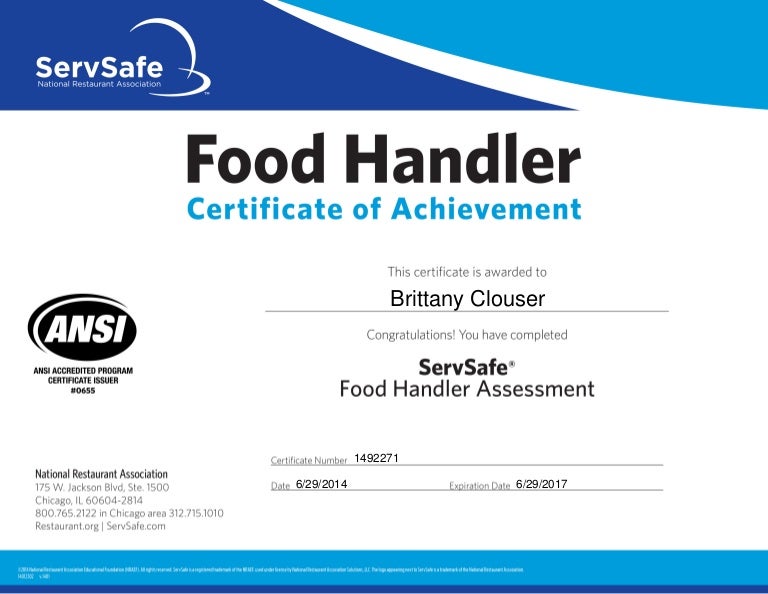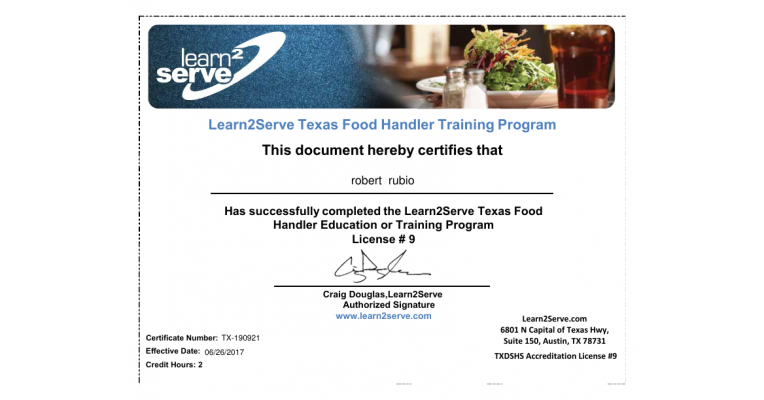Obtain Licensed: Master Food Safety And Security With Food Handler Accreditation
The value of getting a Food Trainer Accreditation can not be overstated in today's food service landscape. As the industry encounters raising analysis relating to food security requirements, understanding the certification procedure and its effects ends up being vital.

Value of Food Security Certification
Food safety and security accreditation is essential for making certain that food trainers are equipped with the expertise and skills essential to keep high standards of health and safety in cooking and service. This qualification not only boosts the proficiency of people working in the food sector however additionally promotes a society of safety that profits both customers and workers.
By acquiring food security certification, food handlers come to be knowledgeable about crucial methods such as correct food storage, cross-contamination prevention, and individual hygiene requirements. ServSafe Food Handler. This understanding significantly minimizes the threat of foodborne illnesses, which can have serious wellness implications and impact public count on food facilities. Moreover, certified food handlers are much better prepared to adhere to national and local guidelines, therefore minimizing the risk of legal obligations and charges for food organizations.
Additionally, having certified staff can enhance an establishment's reputation, as consumers increasingly prioritize safety and security in their eating experiences. Inevitably, food safety and security qualification is not simply a regulative demand; it is an important investment in the overall top quality and integrity of food solution operations, fostering trust and ensuring that safety and security continues to be a leading priority in the industry.

Summary of Qualification Process
Protecting food safety and security certification includes an organized procedure designed to gear up food trainers with the essential knowledge and skills. This procedure typically starts with selecting a recognized training program, which can be supplied in various formats such as in-person classes, on the internet training courses, or crossbreed alternatives. Participants should select a program that satisfies neighborhood governing requirements and straightens with their understanding choices.
As soon as signed up, candidates take part in detailed training that covers vital food security ideas and techniques - ServSafe Food Handlers Card. This training commonly consists of interactive components, real-world situations, and evaluations to strengthen discovering. After finishing the coursework, participants should pass an accreditation examination that assesses their understanding of food security principles
Upon successfully clearing the test, people get their food handler certification, which is typically valid for a details duration, commonly ranging from one to three years. It is essential for certified food trainers to remain updated with any adjustments in food security policies and practices, demanding routine renewal or continuing education and learning. This accreditation process is essential for making sure that food handlers are knowledgeable concerning risk-free food handling techniques, consequently decreasing the threat of foodborne health problems and promoting public wellness.
Secret Subjects Covered in Training
A detailed food handler training program commonly covers a number of key subjects essential for preserving food safety and protecting against foodborne diseases. Understanding the concepts of food safety is fundamental, including the relevance of proper health practices for food handlers. This consists of handwashing techniques, proper use of handwear covers, and individual tidiness criteria.
Another important area is the recognition and management of food dangers. Trainees find out about organic, chemical, and physical threats, along with methods for preventing cross-contamination. Temperature control is likewise stressed, as maintaining appropriate food preparation and storage temperatures is crucial for hindering bacterial growth.
The training program addresses secure food storage space techniques, describing just how to effectively organize and classify food items to make sure quality and safety and security. Additionally, participants are educated on cleaning and sterilizing procedures for devices and surface areas to remove possible contaminants.

Advantages of Getting Licensed
Getting food handler qualification provides countless advantages that prolong past personal understanding and skills. Primarily, it boosts an individual's understanding of secure food practices, which is vital in preventing foodborne health problems. This understanding not just safeguards the health of consumers yet also promotes a society of food safety and security within the workplace.
Furthermore, qualification shows a commitment to expertise and responsibility. Companies usually prefer or require licensed employees, recognizing that licensed people are more probable to adhere to security procedures and guidelines. This can bring about boosted ergonomics and minimized responsibility for companies, as trained staff are better equipped to handle food safely.
In addition, obtaining certification can boost a person's self-confidence in their duty within the food solution market. This confidence can convert right into much better customer care and fulfillment, as employees that recognize food safety and security are a lot more likely to communicate effectively concerning food prep work and handling.
Finally, numerous certification programs supply upgraded training and resources, ensuring that qualified people remain educated regarding the most up to date regulations and ideal methods, thereby enhancing their function as well-informed specialists in the food security landscape.
Profession Opportunities in Food Safety And Security
The structure of food safety and security understanding obtained through qualification opens up ServSafe Food Handler a range of job chances within the food sector. As food safety policies come to be increasingly rigid, businesses seek certified specialists to ensure compliance and keep high criteria.
Individuals with food handler accreditation can seek roles such as food security examiners, that assess facilities for adherence to health and wellness guidelines, or food safety and security supervisors, charged with creating and implementing safety and security methods in food handling plants or dining establishments. Additionally, roles in quality control and control are offered, where experts check manufacturing procedures to minimize risks related to foodborne illnesses.
Furthermore, the growing pattern of food sustainability and organic products has created opportunities for food safety consultants who specialize in advising firms on ideal techniques. Those with a qualification can additionally discover settings in education and learning and training, assisting to educate others about secure food taking care of techniques.

Conclusion
Food trainer certification serves as a vital component in enhancing food safety within the food service industry. As food safety proceeds to be a top priority, the qualification opens up doors to countless job possibilities in this crucial area.
By acquiring food security accreditation, food handlers become acquainted with crucial techniques such as appropriate food storage, cross-contamination prevention, and personal health requirements.Protecting food safety certification entails an organized process developed to equip food trainers with the needed understanding and skills. It is crucial for qualified food trainers to stay upgraded with any type of modifications in food safety laws and methods, necessitating routine revival or continuing education and learning.A detailed food handler training program typically covers numerous essential subjects vital for maintaining food safety and security and stopping foodborne illnesses.Food trainer certification offers as an important part in improving food safety within the food service sector.